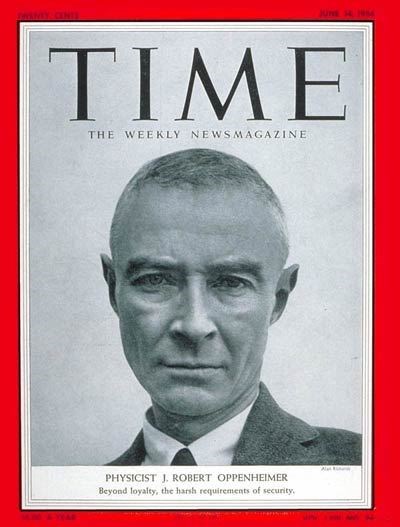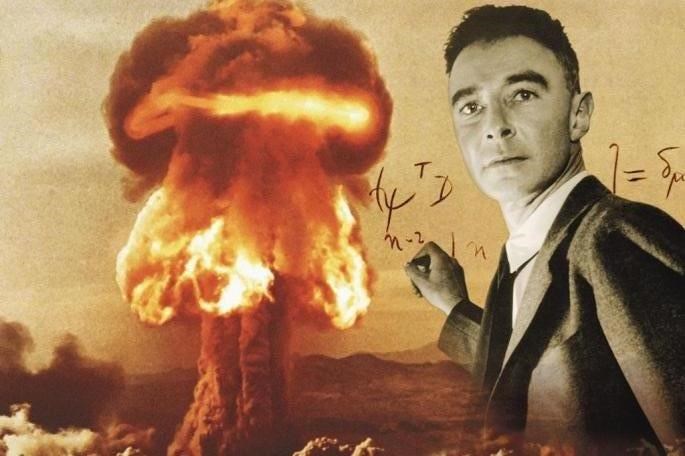"I am become Death, destroyer of worlds."
 Robert J. Oppenheimer on the front of TIME magazinehttps://content.time.com/time/covers/0,16641,19540614,00.html
Robert J. Oppenheimer on the front of TIME magazinehttps://content.time.com/time/covers/0,16641,19540614,00.html
When someone is asked, who wrote E=mc2, most would say Albert Einstein. When someone is asked, who created the theory of gravity, most would say Isaac Newton. But if someone asked, who was the father of the atomic bomb, very few people would say Robert J. Oppenheimer. Oppenheimer lived a complex life, being a theoretical physicist during World War 2, and the Cold War. He was born to a wealthy New York family in 1904. He was interested in science at a young age, went to multiple colleges, graduating with prestigious degrees. At 37, he was the head of the top secret Manhattan Project. At 43, he headed the Atomic Energy Commission(Scribner’s Sons). Later in life, he was accused of giving classified secrets away to the enemy, but was found innocent. Oppenheimer used his bravery and selflessness to change the face of the modern world for the better, making him a hero.
Oppenheimer used his bravery to express his opinion against those who made decisions out of fear. In the 2006 biography, World of Physics, the author explains Oppenheimer's public opinion on thermonuclear weapons after the second World War. “As the 1940s drew to a close, President Truman decided that it was in the country's best interest to develop the hydrogen bomb. Oppenheimer's position was clear; he did not believe in the proliferation of nuclear weapons, and he did not hesitate to express his opinion in public. His position disturbed many of those in power in Washington. In November of 1953 William Borden, former executive director of Congress' Joint Atomic Energy Committee, sent a registered letter to J. Edgar Hoover of the FBI, stating he had considerable evidence to show that Oppenheimer was a Soviet agent. In December Oppenheimer was informed that his security clearance, which he needed to have access to classified information, was revoked on suspicion of unpatriotic activities on his part.”(World of Physics 15). Oppenheimer fought against the proliferation of nuclear weapons, when the second Red Scare was ongoing, making it dangerous to even question National Security. His classified information was revoked for him being “unpatriotic”, even though he was only voicing concern about a nuclear arms race. Later in life, Oppenheimer would regret his original decision to use the bomb to kill civilians. “Oppenheimer was one of a panel of four scientists including Ernest Orlando Lawrence, Enrico Fermi, and Arthur Compton that was asked to formulate an opinion regarding the use of the atomic bomb to end the war against Japan. They were told that there was a choice between a military invasion of Japan, which was certain to cost many American lives, and a nuclear attack on a military target that would also kill many civilians. Confronted with this choice, the panel voted to use the bomb. Oppenheimer later regretted his decision, saying that the intentional slaughter of civilians had been unnecessary and wrong.”(World of Physics). Oppenheimer regretted the decision, but his choice help saved many American lives, but at the cost of Japanese casualties in the hundreds of thousands. Oppenheimer used his bravery to help stop the deadliest war in history, and tried to stop an arms race, even at the expense of his career. Robert J. Oppenheimer in front of a photo of a hydrogen bombhttps://www.thetimes.co.uk/article/inside-the-centre-the-life-of-j-robert-oppenheimer-by-ray-monk-39pmdmscdzq
Robert J. Oppenheimer in front of a photo of a hydrogen bombhttps://www.thetimes.co.uk/article/inside-the-centre-the-life-of-j-robert-oppenheimer-by-ray-monk-39pmdmscdzq
Oppenheimer used his selflessness to try and stop the nuclear arms race. In the AEC, he had very little support for a hydrogen bomb. “Of numerous committees on which Oppenheimer served thereafter, the most important was the AEC's nine-member General Advisory Committee (GAC), of which he was chairman. In October 1949, three months after the first Soviet atomic bomb test, the GAC was asked to consider whether the United States should undertake a crash program to develop a thermonuclear weapon. Its negative recommendation was not accepted by President Truman and was not made public. The episode emphasized the growing cleavage between advocates of large offensive nuclear weapons and advocates of more varied weaponry and tactics, as represented by Oppenheimer and the GAC. Oppenheimer's less than enthusiastic support of the hydrogen bomb program failed to mollify those who regarded him as leader of the opposition.”(Scribner's Sons). Even though there was backlash in Washington for his(and his peers) opinions on building a hydrogen bomb, Oppenheimer still stood strong, because he felt like he had a moral responsibility to make sure no more lives were lost to nuclear weapons. That responsibility made him also wanted to educate the public on these weapons. “As a result of his spectacular accomplishment with the atomic bomb, Oppenheimer was elevated to a position of extraordinary prestige and power in both the scientific and the political worlds. He became an international celebrity and governmental adviser, raising questions of conscience for the scientific community and arguing for United Nations (UN) control of nuclear weapons. In 1947, at the Massachusetts Institute of Technology, he gave a talk in which he made the comment that as a result of their development of the atomic bomb physicists had known sin and thus had a responsibility to help educate other scientists, politicians, and the public about the devastating power of these new weapons.”(Bederson). He wanted the UN to have control of the nukes, and said they(the atom bomb physicists) has the responsibility to make sure that the public was informed of these weapons. Oppenheimer wanted to stop the US from creating an arms race with the Soviet Union, even if it meant him later being investigated for treason.
Oppenheimer used bravery, and his selflessness to forever change the face of the world for the better. His heroic actions of stopping World War 2, and trying to stop an arms race makes him a hero. Oppenheimer was an inspiration to many of his fellow scientists, friends, and many more. He did what he thought was best for the world, even if it meant the deaths of the innocent in war, or stopping an arms race between superpowers. When the humanity finally possessed the energy of a star, Oppenheimer said this during the first test, “I am become Death, destroyer of worlds.”
Works Consulted
J. Robert Oppenheimer." Notable Scientists from 1900 to the Present, edited by Brigham Narins, Gale, 2008. Biography in Context, https://link.galegroup.com/apps/doc/K1619002454/BIC1?u=powa9245&xid=eb5ebad3. Accessed 29 Jan. 2018.
"Julius Robert Oppenheimer." Dictionary of American Biography, Charles Scribner's Sons, 1988. Biography in Context, https://link.galegroup.com/apps/doc/BT2310006363/BIC1?u=powa9245&xid=9121683d. Accessed 31 Jan. 2018.
Bederson, Benjamin. "J. Robert Oppenheimer." Encyclopedia of Science, Technology, and Ethics, edited by Carl Mitcham, Macmillan Reference USA, 2005. Biography in Context, https://link.galegroup.com/apps/doc/K3434900480/BIC1?u=powa9245&xid=e23c786c. Accessed 31 Jan. 2018.
"J. Robert Oppenheimer." American Decades, edited by Judith S. Baughman, et al., Gale, 1998. Biography in Context, https://link.galegroup.com/apps/doc/K1602000773/BIC1?u=powa9245&xid=c669564d. Accessed 31 Jan. 2018.
Carnes, Mark C. “About Robert J. Oppenheimer.” About J. Robert Oppenheimer, 1999, www.english.illinois.edu/maps/poets/a_f/ai/aboutopp.htm.
J. Robert Oppenheimer." World of Physics, Gale, 2006. Biography in Context, https://link.galegroup.com/apps/doc/K2434100169/BIC1?u=powa9245&xid=330d8d2d. Accessed 5 Feb. 2018.
Page created on 2/13/2018 5:34:38 PM
Last edited 2/16/2018 5:11:23 PM
